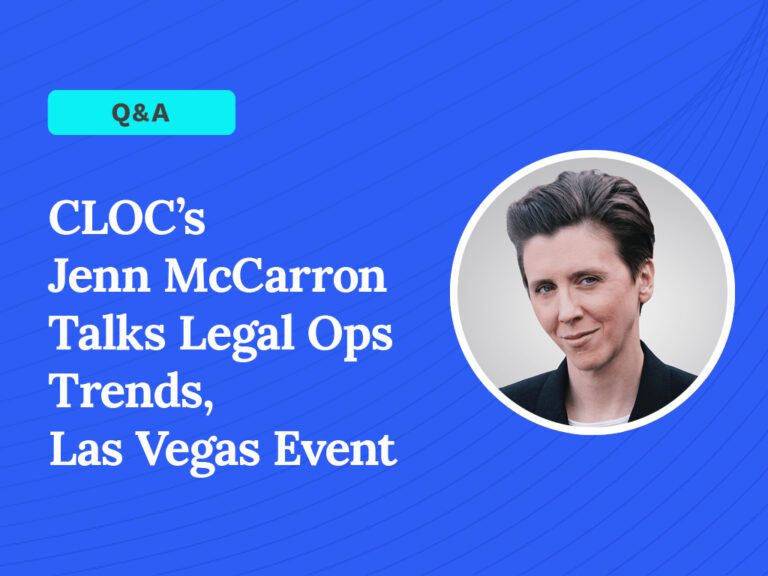CLOC’s Jenn McCarron Talks Legal Ops Trends, Las Vegas Event
May 10, 2024

Jenn McCarron, President of CLOC (Corporate Legal Operations Consortium), is an innovative legal and tech leader who builds teams that revolutionize major organizations and the industry at large. She hosts the “CLOC Talk” podcast, which examines both the technical and philosophical elements of legal transformation. Most recently, McCarron served as the Director of Legal Operations and Technology at Netflix. Prior to that, she held roles at Spotify and Cisco.
This is the second part of a two-part interview in which Jenn McCarron talks legal ops trends and the future of CLOC ahead of the CLOC Global Institute running May 6-9, 2024 in Las Vegas. You can read the first installment about legal ops innovation and career development here.
Earlier this year you became president of CLOC and you’ve been a member of the CLOC board for four years, I believe. How has the organization evolved over that time and where do you want to lead it as you take the reins?
Jenn McCarron: We’ve had unprecedented- almost hyper growth. We’ve become a household name in the industry and in legal. We are the front-runner trade group association that drives standards, best practices, community knowledge sharing. It helps people get jobs, helps you create and build an interconnected network so that you can know more, know how to do your own work more, validate your own work and then have this immense group to seek your next opportunities out from.
It feels like we’re rounding the corner from start-up. We’re still trying to figure out how to grow and scale the organization. We now have an amazing 16-plus person professional staff that are mounting our events. These people are experts and we needed that.
So we can scale this thing and more people can come in, get their work validated and feel validated. We’re often the one person doing this job in a legal department. More and more, I think CLOC in the last 10 years has served as that validation house for me.
That is the powerful best practice making ability we all have. And CLOC really serves as the community for that, the preeminent one just by way of size and reach, and also our content. And then another part of our strategy we’re lighting up is the conversation element. Everyone is engaging in these great community settings and sharing knowledge.
What are you hoping this edition of the May will bring? What do you want CLOC members to get out of the event?
Jenn McCarron: We want to look at this event more as a battery recharge than ever before. Recharge was chosen by the staff because of how much we all talk about coming to these events and going, “I’m with others like me. I can really talk about the problems at work and feel heard and understood immediately and maybe walk away with two or three new ideas on how to do something and a person to call when I need.”
That’s how I’ve used CLOC over the years. And now we’re trying to program that at scale with a recharge-themed event. At the event we have more concentrated tracks for law firm professionals, our newest membership group. We started designing in the last two years programming that gives people a place to work on what the world knows as soft skills, how to build your brand on LinkedIn, how to do storytelling. There are tracks for that kind of content.
And then there are places to literally recharge, like quiet rooms. I think, Lisa Konie, our interim executive director, might be leading a meditation class. So yeah, you’re going to see more diversity in programming to give people a place to literally recharge or activate different parts of your brain while hanging with 3,000 of your closest friends in CLOC.
And what you think people can get out of it?
Jenn McCarron: There’s a real energy there that comes in. And I don’t mean like LA energy, woo woo energy, but there is an optimism. When you put together that group of people, we’re the most resilient. We’re tough, we’re staring at blank spaces, we’re working with all different types of lawyers, some of whom are trained to break down the problem. And sometimes you’re just the problem and you get broken down by that lawyer’s analysis of your slides.
It’s hard work going from zero to one and you put all those people together and we don’t have to fight. It’s not for work purposes, but you get to sit back and connect and share notes and validate. And there’s an energetic lift there that people really love and have said to me, there’s a vibe here. It’s very positive.
The DNA of CLOC is very giving. Any one of us can call any one of us, “Do you have time to talk me through a problem?” And we all give it. So when you put that under one roof in a Vegas resort casino, it’s all in the room and people go away with those contacts and feeling really heard and seen and understood and recharged.
Let’s zoom out for a minute and look legal ops more generally. As we said earlier, this field is evolving so rapidly. What do you think are going to be some of the top trends emerging going forward?
Jenn McCarron: The advent and warp we’ve gone into around artificial intelligence is a big trend. Machine learning’s been around for a number of years and now the Generative AI piece, wow. Just wow. It’s going to change the shape of a lot of this work. There’s a lot there that’s unknown that needs to be defined.
We have to know how to accelerate re-engineering the workflow and teaching the legal folks what it means and what they should start or stop or continue doing. And none of us are skilled in that at this moment today. It’s all theoretical. I think we’re really going to learn it on the job.
I think the next two, three years are going to be proof of concepts of these technologies over and around all the legal data or the forms or the documents or the contracts or the compliance data, et cetera. We’re going to be deep in unknown and then trying to pull forward the solutions that are version one.
We’re going back into some kind of build mode there. And I think we’re all going to come out with what’s really next in legal ops: the ability to craft narrative from all of this data that comes out of all of these systems, some of which you use AI to get data out. These narratives have to make sense for the C-suite. You can’t just say, “I put the tech in, we’re done.” I want us to become those storytellers. That’s a different skill set. It’s analytical.
You mentioned a little bit about workflows. What methodologies have you found most successful in your work, like using roadmaps or objectives, key results?
Jenn McCarron: They all work. They’re all good, and they all do the same thing. It’s tomato, tomato on all of this. The ones when I was at Cisco, we were Lean Six Sigma, and that was an awesome methodology to get behind, especially when they added the Lean part. Lean ultimately stems from a waste reduction methodology where you’re just looking at how anything moves and looking at the waste versus what’s core to move some piece of information or something across an assembly line. That really resonated with me.
When I went to Spotify, it was an Agile product management run company. I love the more jagged creative iterative process in Agile. That’s what I learned there. After Lean Six Sigma is when I started to just draw. I would just point my fingers at the PowerPoint or the Google Slides and draw, and that’s where my creativity came out more via a methodology. I was very creative at Cisco also. I was an instructional designer there also drawing trainings all day, which is very fun.
And then Netflix didn’t have a methodology. They said, “Just make sense and speak clearly.” And a few times in my team we would do objectives, key results, and the former Google people who were at Netflix would bristle. So we would just delete objective and key result off the strategy doc, but it would still be written that way.
It was a very plain English memo-driven framework at Netflix. But it has the formula of all of these project management or product methodologies behind it. What’s the problem you’re solving, what is the solution proposal and getting buy-in along the way. That’s Lean Six Sigma, that’s Agile product management.
Is there anything else that that you wanted to talk about or communicate?
Jenn McCarron: Passion is a very important value also to bring into the formula of this work and into the career here. And sometimes you won’t have it, or you might not have it in the beginning. You have to go find that. It is on all of us to find that both in our personal lives and in the work.
And I had to put my head down at Cisco for a few years and do some real work and some really crappy projects, like really crappy, and then some good ones.
And that’s what you have to do sometimes. You have to listen, put your head down, do some of this work. Passion doesn’t come in like an Easter basket bundle and you take it out and you’re like, “Look at all this chocolate.” It comes from some of the pain or suffering or enduring the harder things.
Do the harder things. Go where it’s hard, go where it’s dark. Endure and you will come out with something that is greater than you can have even imagined. And then you’ll get passion, and you use that fuel in front of your people, your stakeholders, your legal departments. They’ll follow you. They’ll follow you up the mountain.
Read part one of the interview here.
Must read intelligence for general counsel
Subscribe to the Daily Updates newsletter to be at the forefront of best practices and the latest legal news.
Daily Updates
Sign up for our free daily newsletter for the latest news and business legal developments.




